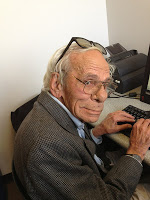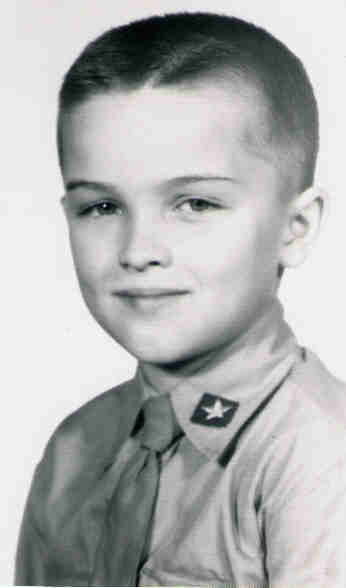Work. As a boy and teen, I was in a
perpetual state of work avoidance. It
didn’t matter if it was chores at home or homework for school, I did not want
to do it. When Mom asked me to do the
vacuuming and dishes, I would do the vacuuming but would delay doing the dishes
until it was very late and I had to go to bed before school the next day. As for the homework, I did do that, but
procrastinated as long as possible.
well when I attended Sacramento State College right out of high school in
1966. My English 101 class introduced me
to adult fantasy novels. The professor
told us that his professional colleagues thought he was crazy to teach his
selected book of ‟trash” as English Literature.
Our professor told us that we would be reading and discussing the story because
it was the up-and-coming genre of literature.
He was so very correct as the book we studied is Tolkien’s Lord of
the Rings. I got so involved in the
story that I neglected most of my studies for two weeks and got so far behind I
was demoralized and so went on academic probation at the end of the
semester. I then did not even try the
next semester so I flunked out of my first year of college. I was still very immature.
join the Air Force to avoid being drafted into the Army or Marine Corps. I worried about the draft for nothing. While I was attending Air Force basic
training, I received my draft notice—for the Navy.
and also taught me team work, skill with administrative work, a bit of
self-discipline, kept me out of Vietnam, and even paid me to learn. Who could have asked for more? After three years with my assigned unit, I
was selected to set up a newly organized squadron’s administrative section for
the squadron commander and first sergeant.
It turned out that I really must have been a good worker as I was given
two medals for the work I did throughout my enlisted time.
following my wife’s passing. Then my
depression was so bad I reverted back to my youth and avoided work whenever
possible. Then after ten-years of
self-pity, I began to come alive again and sought out things to do that were
not work but mostly recreation. I do
have modest financial stability through the VA, Civil Service retirement, and
Social Security but I needed to supplement my income a little bit, so after a
two-year search, I finally landed a position as a cashier in an adult video
store where I worked from 1 August 2012 through June 2016.
totally different. My behavior divides
according to specific scenarios. The
first is, if the not-working thing is my property and can be fixed. If I can fix it, I will try and do so. If I cannot fix it, I send it to or call in a
repairman. If that is not possible, I
will replace it or do without.
a large project, if it is to be fixed, such as replacing the floor and wall
tile in a bathroom. When I was in my
20’s, Deborah and I did just that. I
know exactly how much work it was. At my
age now, I am totally against do-it-yourself projects. If it isn’t broken, don’t fix it. If it is broken, call in an expert repair
person and pay the price.
that I have no direct control over. The
prime example of this is Republican obstructionism in Congress for the past
six-plus years, known to me as the Bonner Do Nothing Republican Congress. The only thing I can do about that is vote
and write letters. Another example is
potholes in city or county roads. I can
notify the authorities where the potholes are but nothing is done. Then there are the roads which are repaved
and repainted and 3 to 6-months later, dug up to replace water or sewer
lines. The powers that be don’t
coordinate getting the underground work done before the repaving, so streets
are often disrupted longer than necessary.
category of things that don’t work. The movie and theater industry repeatedly
miscast actors in their productions.
Specifically, beginning with Maude Adams, productions of Peter Pan
have featured women in the title role.
Barrie’s manuscripts clearly indicate that Peter was small and still had
all his baby teeth. He was not an adult
woman or a teen-age boy. At least Walt
Disney used a 12-year old Bobby Driscoe as the model for the Disney animators;
he just used the wrong aged model. This
past week there was another made for TV broadcast production, Peter Pan
Live, staring yet another adult female as Peter. I am sure it was a good performance, although
I did not watch it. Not to take anything
away from the actress and other cast members, the performance was still a
travesty. The casting system is broken
and does not work with regards to Peter Pan and I am powerless to do
anything but complain. Very frustrating
for me as Peter Pan is my all-time
favorite prepubescent story from childhood.
knows there are many talented youngsters who can sing and dance. If you search YouTube, you can find videos of
the search for and training of the actors who ended up playing Billy Elliott in
the American version stage play. It is
nearly unbelievable the amount of talent children have. There is absolutely no reason to keep casting
adult women as Peter.
end my frustration. While in a movie
theater this past week, I saw a preview of a new Peter Pan movie to be released
in the summer of 2015 titled, Pan.
The role of Pan finally has been assigned to a young boy, one more
closely age appropriate and accurate to the original story. The story itself is another prequel, but I
don’t care about that. I just want to
see a more realistic Peter Pan. So for
me, I can see that someone in the movie industry is actually trying to make
literary accurate movies whose cast actually resembles the characters in the
novels.
that someone cannot begin to fix them.
Maybe there is hope for Congress too.
and then in Redondo Beach. Just prior to
turning 8 years old in 1956, I was sent to live with my grandparents on their
farm in Isanti County, Minnesota for two years during which time my parents
divorced.
in 1958, I lived first at Emerald Bay and then at South Lake Tahoe, California,
graduating from South Tahoe High School in 1966. After three tours of duty with the Air Force,
I moved to Denver, Colorado where I lived with my wife and four children until
her passing away from complications of breast cancer four days after the 9-11-2001
terrorist attack.
therapeutic.





